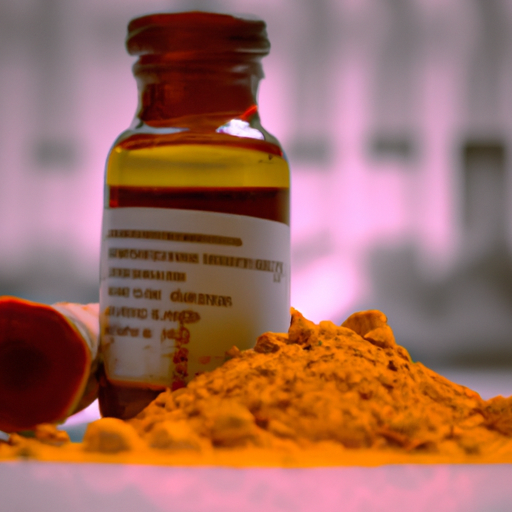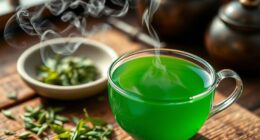As a regular user of turmeric in my diet due to its many health benefits, I was taken aback to discover that it could potentially affect blood test results. Recognizing the possible impact of turmeric on blood tests is crucial for those who use this spice often and depend on precise blood test results for their health care needs.
In this article, I will provide an overview of turmeric and its health benefits, as well as explain the purpose and importance of blood tests. I will explore the potential interference of turmeric in blood tests, including the factors that can affect its effect on test results.
Additionally, I will provide precautionary measures to take before undergoing blood tests and discuss how to interpret the results. Finally, I will touch on the potential health benefits of turmeric consumption, as well as any risks and side effects associated with it.
Key Takeaways
- Turmeric supplements can interfere with certain blood tests, particularly liver function tests and clotting/bleeding tests.
- Individuals taking turmeric supplements should inform their healthcare provider before undergoing any blood tests to avoid misinterpretation of results.
- Turmeric has potential health benefits for conditions such as arthritis, cancer, and Alzheimer’s disease, but caution and moderation should be exercised when incorporating it into the diet.
- Understanding the factors that can affect blood test results, such as fasting requirements and avoiding certain medications or supplements, can help ensure accurate and reliable results.
Overview of Turmeric and its Health Benefits
You might be surprised by how many health benefits you can get from adding turmeric to your diet! Turmeric, a spice commonly found in curry powder, has been used for centuries in traditional medicine for its anti-inflammatory and antioxidant properties. Its active ingredient, curcumin, has been shown to have potential benefits for a range of health conditions, including arthritis, cancer, and Alzheimer’s disease.
In addition to incorporating turmeric into your meals using recipes such as turmeric chicken or turmeric roasted vegetables, you can also take turmeric supplements. However, it’s important to note that the amount of curcumin in turmeric supplements may vary, and the quality of the supplement may not be regulated. It’s always a good idea to consult with a healthcare professional before taking any supplements.
With that said, let’s move on to understanding blood tests and how turmeric can affect them.
Understanding Blood Tests
I’ll now discuss the subtopic of understanding blood tests.
There are various types of blood tests used to measure different components of blood. These components include blood cells, electrolytes, hormones, enzymes, and other substances that can provide insight into our health status.
To better understand blood tests, it’s important to know what each component represents and how it can affect our health. So, let’s dive deeper into each type of blood test and what it can tell us about our bodies.
Types of Blood Tests
When getting blood tests, it’s important to understand the different types in order to prepare properly and avoid any common misconceptions. For example, a complete blood count (CBC) measures the number of different types of blood cells in the body, while a lipid panel checks for cholesterol levels. Other types of blood tests could measure hormone or vitamin levels, among other things.
Knowing which type of blood test you’re getting can help you prepare in advance. Some tests may require fasting or avoiding certain medications or supplements for a period of time beforehand. This is important to keep in mind if you’re taking turmeric or any other supplements, as they could potentially affect the results.
Understanding the types of blood tests can help you better prepare and ensure accurate results.
Moving on to the next section, it’s important to understand what components of blood are measured during these tests.
Components of Blood Measured
One important aspect of understanding blood tests is knowing which components are measured, such as the number of different types of blood cells or the levels of certain hormones and vitamins.
Red blood cells (RBCs) and white blood cells (WBCs) are two of the most commonly measured components in blood tests. RBCs carry oxygen throughout the body and play a crucial role in maintaining healthy organs and tissues. WBCs, on the other hand, are a key component of the immune system and help fight off infections and diseases.
The number and quality of RBCs and WBCs in the blood can provide valuable insights into a person’s overall health. An abnormal count or function of these cells can indicate a variety of conditions, such as anemia, infections, leukemia, or autoimmune disorders. Therefore, monitoring these components through regular blood tests is essential for maintaining optimal health.
However, certain factors, such as medications or dietary supplements, can interfere with the accuracy of blood test results. One such supplement is turmeric, which will be discussed in the subsequent section.
Potential Interference of Turmeric in Blood Tests
I want to discuss how turmeric may interfere with certain blood tests. Specifically, it can impact liver enzyme tests, which evaluate how well the liver is functioning.
Turmeric can also impact clotting and bleeding tests, which assess the body’s ability to form and dissolve blood clots. It’s important to be aware of these potential effects if you’re taking turmeric supplements and need to undergo blood testing.
Impact on Liver Enzyme Tests
Surprisingly, turmeric, the supposed ‘miracle spice,’ can actually skew liver enzyme test results. This is because turmeric contains curcumin, which can interfere with liver function tests. Liver function tests are used to assess the overall health of the liver and to detect liver damage or disease. Elevated liver enzyme levels can indicate liver damage, inflammation, or infection.
To better understand the impact of turmeric on liver enzyme tests, let’s take a look at this table:
| Liver Enzyme | Normal Range | Potential Impact of Turmeric |
|---|---|---|
| ALT | 7-55 U/L | Elevated levels |
| AST | 8-48 U/L | Elevated levels |
| ALP | 45-115 U/L | No impact |
| GGT | 9-48 U/L | Elevated levels |
| Bilirubin | 0.3-1.2 mg/dL | No impact |
As we can see, turmeric can cause elevated levels of ALT, AST, and GGT, which are markers of liver damage and inflammation. Therefore, individuals who are taking turmeric supplements should inform their healthcare provider before undergoing a liver function test to avoid any misinterpretation of results.
Moving on to the next subtopic, it is important to note the potential impact of turmeric on clotting and bleeding tests.
Impact on Clotting and Bleeding Tests
Did you know that when taking certain supplements, it’s important to consider their potential impact on your clotting and bleeding test results? Turmeric, a popular spice and supplement, has been shown to have an effect on coagulation, which can lead to a risk of misdiagnosis in clotting and bleeding tests. Here are a few key things to keep in mind:
- Turmeric can increase bleeding time, which means it takes longer for your blood to clot.
- It can also lower platelet aggregation, which means your blood cells may not stick together as easily.
- Turmeric’s effect on coagulation may be more pronounced in people who are already taking blood-thinning medication.
- The amount of turmeric you consume can also impact its effect on your blood tests.
It’s important to let your healthcare provider know if you’re taking turmeric or any other supplements before undergoing any blood tests. This way, they can take into account any potential impact on your results.
In the next section, we’ll explore some of the factors that can affect turmeric’s effect on blood tests.
Factors Affecting Turmeric’s Effect on Blood Tests
As a language model AI, I can’t provide personal opinions or experiences, but I can give you evidence-based information on the factors that affect turmeric’s effect on blood tests.
The dosage and frequency of turmeric consumption, as well as the timing of turmeric consumption, are both important factors to consider. Studies have shown that consuming high doses of turmeric supplements on a regular basis can interfere with certain blood tests.
The timing of consumption may also play a role in the potential interference.
Dosage and Frequency of Turmeric Consumption
To get the most out of turmeric’s potential health benefits and avoid any interference with blood test results, you should aim to consume it regularly in moderate amounts. This means taking a consistent dosage of turmeric and not overloading your system with it. The recommended dosage for turmeric is usually around 500-2,000mg per day, depending on the individual’s health condition and age. Consuming turmeric in these amounts on a regular basis can help reduce inflammation, improve digestive health, and boost the immune system.
To give you an idea of how much turmeric to consume, take a look at this table:
| Turmeric Dosage | Turmeric Frequency | Benefits |
|---|---|---|
| 500mg | Once a day | Anti-inflammatory, antioxidant |
| 1,000mg | Twice a day | Digestive health, brain function |
| 1,500mg | Three times a day | Immune system boost, pain relief |
| 2,000mg | Four times a day | Skin health, heart health |
Remember, it is important to consult with a healthcare professional before taking any new supplements, including turmeric. Next, we will discuss the timing of turmeric consumption and how it can affect blood test results.
Timing of Turmeric Consumption
When incorporating turmeric into your daily routine, it’s important to consider the timing of consumption, as it could impact the accuracy of certain medical exams.
Turmeric is known for its anti-inflammatory properties and can affect blood clotting, leading to potential interference with blood tests.
If you are taking turmeric supplements or consuming large amounts of turmeric in your diet, it’s recommended to avoid consuming it for at least a week prior to any blood tests.
It’s important to note that the dosage of turmeric consumed also plays a role in its potential impact on blood tests.
While small amounts of turmeric used in cooking are unlikely to cause significant interference, higher doses taken in supplement form may be more problematic.
Therefore, it’s essential to discuss any turmeric supplements or high turmeric intake with your healthcare provider before undergoing any blood tests.
Taking these precautions can help ensure accurate results and avoid any unnecessary concerns or complications.
Precautions to Take Before Blood Tests
Before getting blood tests, it’s important to take precautions such as preparation tips and fasting requirements. This includes avoiding certain medications or supplements like turmeric that may affect the results. Here are some things to keep in mind:
- Be honest with your healthcare provider about all medications and supplements you’re taking.
- Follow any fasting requirements recommended by your healthcare provider.
- Avoid taking any supplements, including turmeric, for at least 24 hours before your blood test.
Taking these precautions can help ensure accurate blood test results and prevent any unnecessary concerns or complications. It’s important to understand that even seemingly harmless supplements like turmeric can affect blood test results, so it’s always best to check with your healthcare provider before taking any supplements before a blood test.
As important as it is to prepare for blood tests, it’s also essential to understand how to interpret the results. By doing so, you can work with your healthcare provider to make any necessary changes to improve your health.
Interpreting Blood Test Results
Understanding the meaning behind the numbers in your blood test results can be like decoding a secret message from your body. Interpreting blood test results requires knowledge of the normal ranges for each value and an understanding of what each value represents in terms of your health.
It’s important to note that blood test results should always be interpreted by a healthcare professional to avoid common misconceptions and misinterpretations. One common misconception is that higher values always indicate a problem, while lower values always indicate good health. However, this is not always the case.
For example, a higher white blood cell count may indicate an infection or inflammation, but it can also be a normal response to physical activity or stress. Similarly, a lower red blood cell count may indicate anemia, but it can also be a normal variation in certain individuals. Therefore, it’s important to understand the context of each result and how it relates to your overall health.
In the subsequent section about other factors that can affect blood test results, I’ll discuss how certain medications, supplements, and lifestyle factors can impact your results and how to properly prepare for a blood test to ensure accurate results.
Other Factors That Can Affect Blood Test Results
Did you know that certain factors, other than medical conditions, can affect the accuracy of your blood test results? One of the most common factors is fasting. Fasting before a blood test is crucial in ensuring an accurate result. If you eat or drink anything before your test, it can affect your glucose and lipid levels, leading to a misdiagnosis. Additionally, certain medications and supplements can alter your blood test results. For example, some medications may increase or decrease your blood sugar levels, cholesterol levels, or liver enzyme levels. Therefore, it is important to inform your healthcare provider of any medications or supplements you are taking before your blood test.
Take a look at the table below to see how different medications and supplements can affect blood test results:
| Medication/Supplement | Effect on Blood Test Results |
|---|---|
| Aspirin | May increase bleeding time |
| Antibiotics | May alter liver enzyme levels |
| Vitamin D | May increase calcium levels |
| Omega-3 fatty acids | May alter lipid levels |
| Iron supplements | May increase iron levels |
It is essential to understand the factors that can affect blood test results to ensure accurate and reliable results. Knowing the effect of fasting and medication on blood test results can help you prepare for your test and inform your healthcare provider of any medications or supplements you are taking. With this knowledge, you can work together with your healthcare provider to make informed decisions about your health. Now, let’s explore the potential health benefits of turmeric.
Turmeric’s Potential Health Benefits
You’ll be pleasantly surprised to learn about the potential health benefits of adding turmeric to your diet. Turmeric has been used for centuries as a natural anti-inflammatory agent. Recent research shows that it can play a significant role in reducing inflammation in the body. Chronic inflammation has been linked to a range of diseases, including heart disease, cancer, and diabetes.
Adding turmeric to your diet may help to reduce the risk of developing these diseases and can also improve overall health and wellbeing. In addition to its anti-inflammatory properties, turmeric also has the potential to prevent cancer. Studies have found that curcumin, the active ingredient in turmeric, has anti-cancer properties and can help to prevent the growth and spread of cancer cells.
While more research is needed to fully understand the effects of turmeric on cancer prevention, these findings are promising. Incorporating turmeric into your diet may be a simple and natural way to improve your health and reduce the risk of developing serious illnesses. However, it’s important to be aware of the potential risks and side effects of consuming turmeric, which we’ll discuss in the next section.
Risks and Side Effects of Turmeric Consumption
Be cautious when adding turmeric to your diet as it may cause digestive discomfort, such as bloating and gas. This is especially important if you have a history of gastrointestinal issues.
Moreover, excessive intake of turmeric may lead to turmeric toxicity, which can present with symptoms such as nausea, vomiting, and diarrhea. It’s crucial to stick to the recommended intake of turmeric, which is 500-2000mg per day.
To avoid turmeric toxicity, it’s essential to consult with your healthcare provider before adding turmeric to your diet. Additionally, it’s crucial to purchase high-quality turmeric supplements from reputable sources and to follow the instructions on the label carefully.
Lastly, be mindful of any supplements or medications that may interact with turmeric, such as blood thinners, as this can increase the risk of bleeding. Overall, while turmeric has potential health benefits, it’s important to exercise caution and moderation when incorporating it into your diet.
Frequently Asked Questions
Can turmeric consumption affect the accuracy of other medical tests, besides blood tests?
As someone who is interested in the effects of turmeric on medical testing, I can tell you that it may interfere with certain medical imaging, but there is no evidence to suggest that it affects pregnancy tests.
Is there a certain amount of turmeric that can be safely consumed before a blood test?
I can safely consume up to 500 milligrams of turmeric per day, but safety concerns exist for those with certain medical conditions. Potential side effects include gastrointestinal issues, and interactions with medications such as blood thinners. Recommended dosage should be discussed with a healthcare provider.
How long should one avoid consuming turmeric before a blood test to avoid interference?
To avoid interference with blood tests, I should avoid consuming high doses of turmeric for at least 48-72 hours prior. Turmeric can affect other health markers, such as liver function tests, if consumed in excess.
Can turmeric supplements have a stronger effect on blood test results compared to turmeric in food?
Turmeric supplements may have a stronger effect on blood test results than turmeric in food due to their higher bioavailability. Medical conditions, dietary restrictions, absorption rates, and drug interactions may also impact results. Evidence-based recommendations for avoiding interference with blood tests are needed.
Are there any other natural remedies or supplements that can interfere with blood test results?
Herbal remedies and dietary supplements can interfere with blood test results. Some examples include St. John’s wort, ginseng, and echinacea. It is important to inform healthcare providers of any natural remedies or supplements being taken before undergoing blood tests.
Conclusion
Overall, while turmeric has many potential health benefits, it’s important to be aware of its potential interference with blood tests. As someone who takes turmeric supplements regularly, I was surprised to learn that it could affect my test results. However, by taking the necessary precautions and discussing any supplement use with my healthcare provider, I can ensure that my results are accurate.
It’s also important to keep in mind that there are many other factors that can affect blood test results. From the timing of the test to the individual’s overall health and lifestyle habits, it’s important to consider all aspects of the test in order to properly interpret the results.
By staying informed and proactive about our health, we can make the most of the benefits that turmeric and other supplements have to offer.










